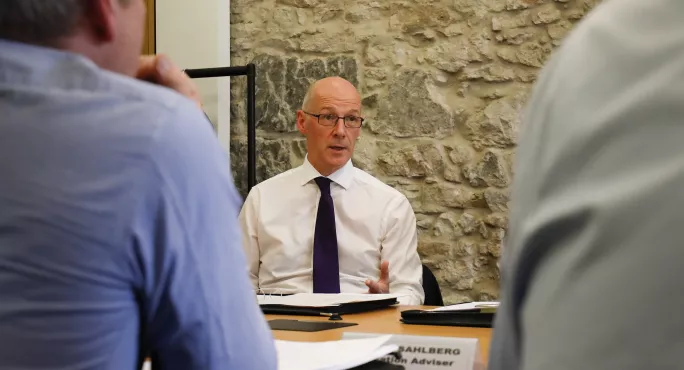The Scottish government gave parents advice that was “not appropriate” about whether children could be withdrawn from controversial national tests, education secretary John Swinney has said.
Campaigners against Scottish National Standardised Assessments (SNSA) - who are concerned about their effect on the country’s youngest pupils - were angered by a government letter last month, which they said contradicted previous advice by insisting that children were obliged to take the tests unless under “exceptional circumstances”.
The letter from Graeme Logan, a deputy director in the government’s learning directorate, cited apparent Solar (Society of Local Authority Lawyers and Administrators in Scotland) advice that parents did not have the right to opt out of SNSAs - taken in P1 (ages 4 and 5), P4, P7 and S3 - apart from “exceptional circumstances”.
But Solar later said that it had not provided a view and did not have an agreed position on the issue. At the Scottish Parliament this afternoon, Mr Swinney made a statement on the matter and said that, although discussions had been held with Solar, “an error was made in our handling of this in that we expressed a view which we believed had been expressed by Solar, but in fact Solar does not express such opinions”.
He added: “So I can only apologise to Parliament for the events that took place in that respect.”
Mr Swinney said he took responsibility, although he had not signed off on the letter from Mr Logan.
Earlier, at a meeting of the Parliament’s Education and Skills Committee this morning, Mr Swinney said the apparent Solar advice in the letter was “presented in good faith, but I think we gave a definition of the source of the advice that was not appropriate”.
New guidance from the government and education directors’ body ADES, sent out this week, suggests that SNSAs are not compulsory, but should be seen as an “integral part of everyday learning” and had been taken by 94 per cent of pupils at the appropriate ages in 2017-18, the first year of the assessments.
Mr Swinney told Parliament after his statement this afternoon that, while the assessments were not compulsory, “there is no legal right for parents to withdraw their children from the assessments”.
He added: “In fact, there is no stautory right for parents to withdraw their child from any aspect of schooling other than some parts of religious observance and instruction. So the position on standardised assessments is the same as it is for literacy and numeracy.
“In practice, should any parents or carers have any particular concerns about their child’s participation, they should discuss this with their school.”
A child should not take an SNSA, he said, “when it would not be in their best interests to do so - rightly, it is for teachers, in discussions with parents, to determine when that is the case”.
This, said Mr Swinney, was “consistent with what we have said previously in correspondence with local authorities, schools and parents”.
Eileen Prior, executive director of national parents’ body Connect, said the new government position “confirms that these tests are not compulsory - that is all we need to know”.
She added: “If they are not compulsory, then parents can discuss their concerns with their schools and can withdraw their child from the P1 test. I am sure that no school would want to force a child or a parent into a situation which might cause distress.
“We will continue to campaign for the P1 test to be scrapped. Highly rated education systems in other countries do not test children at this age. The developmental range, risks of stress and alienation from education are too great, just for the sake of national statistic gathering.”





